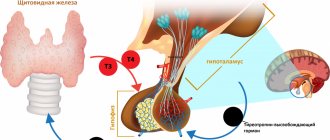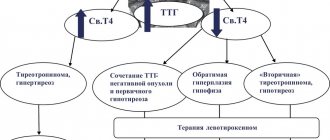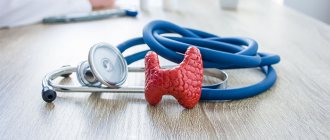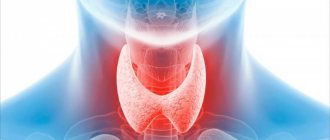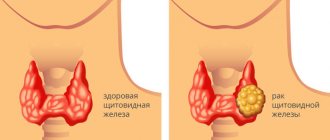Violation of the full functioning of the thyroid gland is usually associated with a deficiency in the body of useful substances: vitamins and microelements. With minor disruptions in the endocrine system, a person feels constant lethargy, decreased performance, and memory impairment.
Further weakening leads to serious pathologies. For example, the formation of goiter, swelling, weight gain or sudden loss of body weight with increased appetite, sleep disturbances, short temper and irritability, high temperature.
Endocrinologists identify several causes of thyroid diseases. Among them, a special place is given to unbalanced nutrition, which leads to a lack of important microelements in the body. In fact, without receiving full “recharge” from the outside, this organ of the endocrine system “fades away.” The synthesis of hormones T3 and T4 sharply decreases, which leads to the development of a whole bunch of chronic pathologies. Various medications are used to treat thyroid diseases.
However, to prevent diseases, endocrinologists advise periodically taking multivitamin complexes with microelements in the form of food additives.
Vitamins for the thyroid gland
The following vitamin groups provide a stable supply of hormones to the endocrine system:
- Retinol (A) – is responsible for protein biosynthesis. Vitamin group “A” has a beneficial effect on the immune system, improves the condition of the mucous membranes, bones and teeth. Retinol strengthens nails and hair, relieves swelling and sagging skin, and has a good effect on vision. Usually, the “A” + “E” complex is prescribed for prevention in order to enhance the positive effect of exposure.
- Vitamins B6, B12 – pyridoxine and cobalamin. Vitamin group “B” accelerates metabolic processes. Increased metabolism prevents the appearance of goiter, obesity, diseases of the cardiovascular and endocrine systems.
- Cholecalciferol (D) - comes from food and is also synthesized in the skin under the influence of moderate amounts of UV rays. A deficiency of this compound leads to the disease hypothyroidism (long-term deficiency of the hormone T3 and T4). Endocrinologists recommend eating foods high in this substance or periodically taking vitamin supplements.
- Antioxidants. This group includes tocopherol (E). In cosmetology, vitamin supplements based on this compound are very popular. They slow down the aging process, relieve skin puffiness, and smooth out wrinkles. Tocopherol improves the absorption of iodine compounds by cells. It is also assigned together with group “A” to mutually enhance the effect. However, doctors advise not to overuse tocopherol, since its excess with a lack of selenium causes hypothyroidism.
In addition to vitamin complexes, the health of the thyroid gland depends on the presence of microelements in the body. Important minerals include:
Iron is a trace element that affects the level of hemoglobin in human blood. Normal iron content helps to steadily transport oxygen to the organs and tissues of the body. As with “E” antioxidants, excess or deficiency of the mineral leads to problems with the endocrine system, in particular causing hyperthyroidism.
Selenium is a trace element, without which the production of hormones T3 and T4 is impossible. This mineral protects organs from oxidation, improves metabolism, controls growth and supports reproductive function in men. A lack of selenium leads to a disease such as Hashimoto's thyroiditis - problems with immunity.
Iodine - without this trace element the endocrine system will not be able to function fully. The mineral is involved in metabolic processes and in the synthesis of more than 100 enzymes, and regulates the water-salt balance of the body. A deficiency of the element leads to the formation of goiter and the development of hypothyroidism, and impairs intellectual abilities. Excess iodine compounds lead to poisoning of the body.
Products for thyroid disease
To reduce the risk of pathologies of the endocrine system, doctors recommend dietary nutrition with substances important for thyroid health. To prevent diseases and treat the organ, it is necessary to include in the diet the following foods:
- Feijoa and persimmon - these iodine-containing fruits can be eaten at any time of the year. Fruits are also rich in sodium, magnesium and iron. In addition, persimmon and feijoa are a storehouse of vitamin compounds A, C and P.
- Fresh seafood - mussels, crabs, fish, lobsters, shrimp, squid, etc. The same iodine-rich foods as persimmon and feijoa. Contains zinc, fatty acids, phosphorus, protein, B12. People who love seafood have strong immunity; their endocrine system is regularly fed with important hormones.
- Sea kale is the primary source of iodine compounds. What kind of prevention of endocrine diseases will be possible without this ingredient? It is enough to eat 70-100 grams of seaweed per day for the body to consistently produce thyroid hormones. Also contains phosphorus, magnesium, silicon and a number of other useful minerals.
- Red fish - salmon, trout, pink salmon, salmon and any red meat contain tyrosine. This substance helps synthesize necessary hormones. If there is enough red fish in the diet, then the body receives calcium, omega-3 fatty acids, vitamin D, and phosphorus. In addition, fish liver is a source of selenium.
- Spinach and onions strengthen the immune system and are also natural antioxidants. In addition, spinach contains a unique set of microelements important for the health of the endocrine system. These are phosphorus, zinc, iodine compounds, sodium, manganese and others.
It is also necessary to note the benefits of apples, berries and nuts for all body systems. Pine nuts and walnuts are rich in iodine compounds. Apples and blueberries contain antioxidant substances that protect cells from the harmful effects of free radicals.
What will you have to give up?
Meat consumption needs to be reduced. Especially fatty ones. Especially fried. And certainly, even as an exception, there should not be any smoked meats or sausages on the table: processed products contain little actual meat, but there is more than enough of all kinds of preservatives, dyes and additives that disrupt the functioning of the thyroid gland.
It is also worth giving up pickled vegetables - cabbage, apples, cucumbers, watermelons. Fermentation during fermentation promotes the release of certain substances that inhibit the functioning of the thyroid gland.
Both milk and dairy products are prohibited. The only exception is if you have your own proven cow that produces natural milk: let it sour and drink in small quantities.
And of course, tea, coffee, sweet soda and alcohol are not indicated on any diet. As well as rich pastries, cakes and cookies.
Harmful products
Endocrinologists talk about a balanced and proper diet for a reason. According to WHO statistics, over 670 million people in the world suffer from various forms of hyperthyroidism, and more than 1.7 billion are at risk of developing pathologies of the endocrine system. Almost 70% of this number love and eat junk food daily. This is a reason to think!
What foods should you avoid if you have thyroid problems?
- Sugar. All popular and cheap foods contain sugar in incredible quantities. These are sweet and carbonated drinks, pastries, cakes, candies and more. There is more harm from such food than good. Autoimmune diseases and diabetes are caused by uncontrolled consumption of sweets. With such a diet, the level of hormones decreases, almost all systems are overloaded, and the body does not perceive insulin.
- Fried and fatty foods contain trans fats that are unhealthy. If you like to eat fried foods, try to add more greens, fish and seaweed to your diet. If there are obvious problems with the endocrine system, you should reduce or even eliminate the consumption of fried foods, because it reduces the production of hormones T3 and T4.
- Gluten is a substance (gluten) found in cereal plants and causes great harm to a healthy body. Foods high in gluten have been linked to autoimmune disorders such as Addison's disease, type 1 diabetes, rheumatoid arthritis and hypothyroidism. Gluten is found in baked goods, wheat bread made from premium flour, etc.
- Convenience foods, fast food, preservatives - all this food cannot be called beneficial for human health and the endocrine system.
As for alcohol, coffee, cigarettes and strong tea, they should also be excluded from the diet if there are problems with the production of T3 and T4 hormones. A healthy person can afford to drink coffee or wine in moderation, but with pathologies of the immune system, such “weaknesses” will lead to serious complications.
Features of nutrition for thyroid diseases
In modern endocrinology, certain approaches to therapeutic nutrition for diseases of the thyroid gland have been developed.
Nutrition for diffuse toxic goiter (DTZ):
Diffuse toxic goiter (Graves' disease, thyrotoxicosis) is a disease characterized by excessive secretion of thyroid hormones (the so-called hyperthyroidism syndrome) with its diffuse increase. An increase in the size of the gland can be observed in adolescence, in pregnant women, and after menopause. Symptoms characteristic of DTZ: short temper, irritability, increased appetite and at the same time loss of body weight, rapid heartbeat often with a disturbance in its rhythm, constant sweating, sleep disturbance, “hot flashes”, feeling of heat.
Hyperthyroidism is accompanied by accelerated metabolism and increased energy consumption, leading to the breakdown of proteins, fats, carbohydrates, loss of potassium, and sometimes other macro- and microelements and vitamins.
Patients with hyperthyroidism syndrome need a high-calorie diet to replenish increased energy expenditure. In this regard, the diet of such patients should contain a variety of nutrients, and the energy value of the diet should be increased by an average of 20–30% compared to the physiological norm due to all nutrients.
Since hyperthyroidism causes increased breakdown of proteins and loss of muscle mass, special attention should be paid to the protein quota in nutrition. The recommended amount of protein is from 1 to 1.5 g per kg of body weight, of which 55% is of animal origin.
With thyrotoxicosis, the body's need for vitamins increases, so food should contain a large amount of vegetables and fruits. It is necessary to regularly take vitamins A and C, as well as B vitamins or combined multivitamin preparations. Vitamins are needed not only to eliminate their deficiency, but also to prevent disorders in the liver tissue, myocardium and skeletal muscles that occur with this disease.
The body also needs mineral salts, which are contained and enter the body with milk and lactic acid products.
Culinary processing of food is common, but it is advisable to first boil (or blanch) meat and fish to remove extractive substances, and then stew or fry.
Chemical composition of the diet for men:
100 g proteins,
100–110 g fat (25% vegetable origin),
400–450 g carbohydrates,
3000–3200 kcal;
for women, these values are reduced by 10–15%.
The diet should be divided (4–5 times a day or more often) due to the almost constant feeling of hunger in patients. If there are no contraindications, then the amount of free fluid is not limited. Drinks that quench your thirst well (containing no more than 2% sugar, at a temperature not exceeding 15°C) are especially useful. These can be decoctions of dried fruits and rose hips, fruit drinks, weak green tea, low-fat lactic acid drinks, which should be drunk in several sips at intervals of 5-10 minutes.
The diet of patients with hyperthyroidism may contain sea fish and seafood. This is explained by the fact that excess iodine suppresses the formation of thyroid hormones. Vegetables and fruits are recommended as a food source of potassium, and dairy products are recommended for calcium.
Increased excitability of the nervous system and insomnia dictate the need to limit foods and dishes that stimulate the central nervous system: strong tea and coffee, rich meat and fish broths, alcohol, etc.
Nutrition for hypothyroidism:
Hypothyroidism is a condition (complex of symptoms) caused by decreased thyroid function and decreased production of thyroid hormones (thyroid hormones).
In primary hypothyroidism, low production of thyroid hormones causes hypertrophy of the thyroid gland and hyperfunction of the pituitary thyrotrophs with an increase in the concentration of thyroid-stimulating hormone (TSH) in the blood. In secondary hypothyroidism, there is insufficient stimulation of the initially normal thyroid gland by the hypothalamus and pituitary gland. In this case, in a typical case, the TSH concentration is reduced or normal.
The condition of hypothyroidism can be caused by various reasons: autoimmune and other thyroiditis, abnormal development of the thyroid gland, radiation exposure to the thyroid gland, prolonged intake of excess iodine into the body, as well as a lack of iodine in food, which is necessary for the synthesis of thyroid hormones. In the latter case, the so-called endemic goiter.
Hypothyroidism is characterized by: weakness, memory impairment, decreased performance, chilliness, fatigue, rapid weight gain, swelling, dullness and brittle hair, dry skin, menstrual irregularities, early menopause, depression.
It is estimated that the optimal iodine intake is approximately 150 mcg per day. In different regions of Belarus, daily iodine intake may vary.
Iodine supplied with food is very quickly absorbed in the stomach and in the initial parts of the small intestine. A decrease in daily iodine intake to less than 80 mcg is dangerous for health, since it does not allow maintaining a euthyroid state without stimulating the gland and the formation of its hyperplasia (compensatory increase in the size of the gland).
The transport of iodine entering the body is blocked by certain substances, such as thiocyanates, thiooxyzolidones and thiocyanides, contained in some foods, which include cruciferous and squash vegetables: turnips, rutabaga, cauliflower and red cabbage, mustard, turnips, as well as tapioca, which is exotic for Europeans. and cassava. An excess of these products in the diet for a long time, as well as the consumption of milk from cows fed on them, contributes to the development of hypothyroidism.
Through air and water, a person receives no more than 10% of the iodine he needs for life, the main amount enters the human body with food. This is the basis for the prevention of hypothyroidism (primarily endemic goiter) - eating iodized table salt.
A significant amount of iodine is found in seafood (cod liver, squid, crabs, shrimp, mussels, lobsters). Among plant products, iodine is found in large quantities in the following: persimmons, feijoa, dates, chokeberries, currants, prunes, apples, cherries, potatoes, beets, eggplants, garlic, lettuce, spinach, tomatoes, onions, buckwheat, as well as kelp ( seaweed) and other seaweeds (cytosera, fucus).
The energy value of the diet of patients with hypothyroidism is reduced by 10–20% compared to the physiological norm due to fats and carbohydrates. To correct impaired lipid metabolism and hypercholesterolemia in the diet, it is necessary to limit foods rich in cholesterol and saturated fatty acids: fatty meat and dairy products, margarines. Easily digestible carbohydrates should also be limited: sugar, honey, jam, confectionery.
It is advisable to include in the diet foods and dishes that moderately stimulate gastric secretion, as well as having a laxative effect: vegetables, fruits, berries, dried fruits, juices, vegetable oils, fermented milk drinks, products with bran.
When treating hypothyroidism with medication (using medications), it is recommended to limit the consumption of cruciferous vegetables, and also not to combine medications with the consumption of soy products, which can suppress the absorption of thyroid hormones from the intestines.
It must be remembered that diet therapy for hypothyroidism plays a supporting role; the main method of treatment is hormonal replacement therapy.
Prepared by methodologist Litvin I.P.
Internet resources were used in preparing the material
Summary
Proper diet, physical activity and vitamin complexes are the three pillars on which the health of the endocrine system rests. We told you what foods it is advisable to include in your daily diet, and which ones you should avoid. We recommend purchasing multivitamin complexes, and even more so medications for treatment, only after consultation with an endocrinologist. The specialist will also help you choose a special diet and monitor the results of treatment or prevention.
Tokareva Lyudmila Georgievna, therapist, medical offices 36.6
THERE ARE CONTRAINDICATIONS, BEFORE USE YOU MUST CONSULT WITH A SPECIALIST
Diet Mary Chaumont
Mary Chaumont is a famous American writer who was once diagnosed with hypothyroidism, but she did not lose heart and developed a special diet to maintain normal weight in conditions of a slow metabolism. Her diet does not restrict calories too much. To calculate daily caloric intake, you need to apply the formula: multiply your own weight by 25 and subtract 200 from the resulting number. For example, with a weight of 60 kilograms, a person needs to consume 60 * 25 = 1500-200 = 1300 kilocalories per day, which is not too little. In this case, each meal should be 1/6 of the daily calorie intake, that is, in the above example, about 217 kilocalories.
You can eat all the foods that were listed as allowed above, but the main emphasis in this diet is recommended to be on dishes with tyrosine, such as lean poultry, fish, and dairy products with a minimum of fat. Almonds, pumpkin seeds, avocados and lentils also contain this component in abundance. In addition to tyrosine, you should not forget about other micro- and macroelements that are important to get from cereals. Food can only be salted with iodized salt. To replenish the vitamin complex according to the Mary Chaumont diet, vegetables and fruits are needed.
The daily menu from Mary Chaumont may look like this. For breakfast, it is recommended to eat a choice of steamed omelet, vegetable stew, vegetable puree or salad, as well as liquid milk porridge. For lunch, Mary Chaumont offers low-fat cottage cheese with permitted berries, jelly or jelly. For lunch you should prepare low-fat fish soup, light soup, steamed cutlets or fish or chicken soufflé. Berry or fruit mousse, low-fat yogurt or baked apple are suitable as a snack. For dinner, the American writer suggests choosing baked fish with salad or vegetable puree, pumpkin porridge and baked vegetables.


